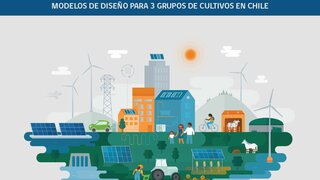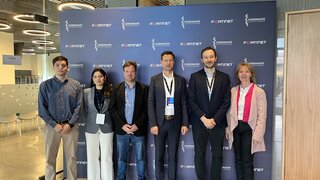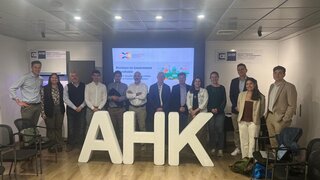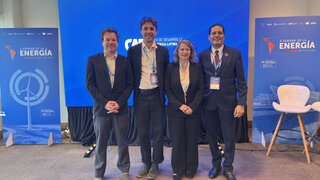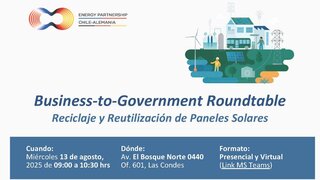Chile and Germany work together to enhance energy efficiency, make greater use of renewable energy, increase efforts for decarbonization and deliver on their international commitments. Together they are transforming their energy systems for the future and open up new fields of business.
We provide a forum for high level political dialogue and bring together representatives from different sectors in order to support a broader use of renewable energies and energy efficiency.
Milestones
Through the joint efforts of Chilean and German actors, our partnership continues to enhance bilateral exchanges and supports the transformation of our energy systems.
Facts & Figures
Population
Chile and Germany are pioneers of renewable energy in their respective region of the world. Accordingly, both countries have set off for a socially sustainable carbon phase-out.
Sources (2020)
Chile: Instituto Nacional de Estadísticas
Germany: Destatis
Total Final Energy Consumption
Both countries are important energy producers, but still heavily rely on the import of fossil fuels on a large scale. Chile´s import quota for primary energy is around 70%. Just like Germany however, it has a steady increase of renewables in its energy production. One of Chile´s biggest assets for the future is its potential of over 1,800 GW in clean power.
Sources:
Chile: Comisión Nacional de Energía, "Anuario Estadístico de Energía 2019"
Germany: International Energy Agency, "Germany 2020 - Energy Policy Review"
Share of Renewable Energy Sources (RES) generation (of gross electricity generation)
Germany is among the leading countries of renewable energy generation. Despite the size of its economy, Germany has managed to steadfastly increase its renewable electricity generation. The integration of increasing shares of variable renewable energy sources into the power grid is an example of lessons learned that Germany is sharing with Chile.
Likewise, Chile has been rapidly increasing its renewable energy generation in the past years. The country harbours enormous renewable energy potential. Crucial energy reforms have set the institutional and regulatory basis for the energy transition, facilitating private investments.
Sources (2020)
Chile: Comisión Nacional de Energía
Germany: Strom-Report.de, energy-charts.de, AGEE-Stat BMWi
Clean Energy Goals
Both Germany and Chile have set themselves ambitious 2030 goals for the transformation of their power sectors. Chile's Long Term Climate Strategy (Estrategia Climática de Largo Plazo, ECLP) establishes goals for 2025 up to 2050, including coal phase-out from its national power grid, green hydrogen production, and zero-emission vehicle deployment, whilst Germany's new government coallition has committed to accelerate their own coal phase-out by 2030, and to phase-out gas for power by 2040.
Source: BMWi (2021); MMA (2021)
Chile: Estrategia Climática de Largo Plazo
Germany: Koalitionsvertrag 2021-2025
What we can do for you

Support Political Dialogue
The Chilean-German Energy Partnership is a platform supporting a high-level intergovernmental dialogue on energy matters. We prepare and facilitate high-level meetings. We organize the exchange between relevant institutions in Chile and Germany.
Promote Best-Practice Exchange
Nobody is forced to repeat the mistake of the other. To learn from one another is therefore key to the Chilean-German Energy Partnership. We arrange and accompany expert delegations. We organize workshops and trainings-on-the-job. All for the sake of promoting what is already there: best-practice.


Connect Business and Politics
We build bridges between politics and business, facilitate access to decision-makers and help you make your position being heard in the partnership countries.
Enhance Energy Transition Communication
Clear communication translates undertakings into understanding. We communicate the Energiewende here and there.


